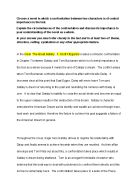In The Great Gatsby Fitzgerald creates a climactic confrontation in Chapter 7 between Gatsby and Tom Buchanan which is of central importance to the text as a whole because it marks the end of Gatsbys dream.
Choose a novel in which a confrontation between two characters is of central importance in the text.
Explain the circumstances of the confrontation and discuss its importance to your understanding of the novel as a whole.
In your answer you must refer closely to the text and to at least two of: theme, structure, setting, symbolism or any other appropriate feature.
In the novel ‘The Great Gatsby’, F. Scott Fitzgerald creates a climactic confrontation in Chapter 7 between Gatsby and Tom Buchanan which is of central importance to the text as a whole because it marks the end of Gatsby’s dream. The conflict arises when Tom Buchanan confronts Gatsby about his affair with his wife Daisy. It becomes clear at this point that East Egger, Daisy will never leave Tom and Gatsby’s dream of returning to the past and rekindling his romance with Daisy is over. It is clear that Gatsby’s inability to cross the social divide and become an equal to the upper classes results in the destruction of his dream. Gatsby’s character embodies the American Dream as his identity and wealth are achieved though hope, hard work and ambition; therefore the failure to achieve his goal suggests a failure of the American Dream in general.
Throughout the novel, tragic hero Gatsby strives to reignite his relationship with Daisy and finally seems to achieve his wish when they are reunited. As their affair develops and Tom finds out about this, a confrontation takes place which results in Gatsby’s dream being shattered. Tom is an arrogant formidable character who believes that the best way to deal with problems is to confront them directly and this is how he wins Daisy back. The confrontation takes place in a suite of the Plaza Hotel where tensions have been boiling over. Tom challenges Gatsby directly: “I suppose that latest thing is to sit back and let Mr Nobody from Nowhere make love to your wife.” Here Tom disdainfully points out Gatsby’s lack of social status and nebulous background which illustrates that he is not only angered by his wife’s infidelity but more importantly Gatsby’s lack of social prestige. As this is Gatsby’s biggest obstacle in his quest for Daisy, the fragility of his dream is palpable here. It is clear to the reader that Tom increasingly regains control of the situation and his wife when he arrogantly asserts “she’s not leaving me!” which reveals his confidence in his own position and sense of superiority over Gatsby. The dream is finally shattered when Tom accuses him of being a “common swindler who’d have to steal the ring he put on her finger” crushing Gatsby’s illusion by exposing his lower class status and criminal connections which have been hinted at in the preceding chapters. Daisy is clearly shaken by the truth about Gatsby’s past and draws “further and further into herself” suggesting her rejection which also highlights her snobbery and materialism. She rejects Gatsby because he is not of her class – he’s a criminal whose whole life has been an act. This climactic point in the novel marks the realisation that Gatsby’s dream of obtaining Daisy fails because of his class which in turn suggests that the American Dream of achieving success through ambition and hard work, without being held back by social class or family background is no longer possible.








